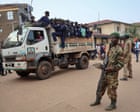
In a series of significant international developments, peace and diplomacy have taken precedence on the global stage, showcasing efforts to resolve longstanding conflicts and secure strategic cooperation. From Africa to the Middle East, nations, leaders, and international organizations are engaging in dialogues that promise hope and change.
In Washington, Rwanda and the Democratic Republic of the Congo (DRC) have signed a landmark peace agreement aimed at resolving tensions in eastern DRC. The conflict, with roots tracing back to the 1994 Rwandan genocide, has seen both nations strive for a comprehensive solution. The deal includes the withdrawal of Rwandan troops from eastern Congo within a 90-day timeframe. This initiative, witnessed by U.S. Secretary of State Marco Rubio, reflects both Rwanda’s and DRC’s commitment to peace despite lingering questions about the details of the agreement. Former U.S. President Donald Trump also played a role in this meeting, highlighting America’s vested interest in the region’s mineral resources.
Simultaneously, a fragile ceasefire in Gaza is under discussion, as recent escalations have resulted in tragic losses. At least 34 individuals have reportedly perished due to Israeli airstrikes. However, Qatar has identified a ‘window of opportunity’ for a truce, a sentiment echoed by various leaders who are working towards de-escalation. This sentiment aligns with efforts by the United Arab Emirates’ airline, Emirates, which has adjusted its operations in response to the volatile regional situation, reinforcing the impact such tensions have on broader geopolitical and economic scales.
In another diplomatic arena, the British government remains cautiously optimistic about the release of Alaa Abd el-Fattah, a British-Egyptian dissident imprisoned in Cairo. The persistence of the dissident’s family, particularly his mother Laila Soueif’s decision to ease her hunger strike, underscores the human element in geopolitical negotiations. The UK’s involvement, signified by opposition leader Keir Starmer’s direct dialogue with Egypt’s President Abdel Fatah al-Sisi, further exemplifies the intricate web of international diplomacy, as both sides also explore enhancing trade relations.
Beyond political dialogues, there are stories of individuals bridging cultures and professions, demonstrating that personal stories often intersect with global narratives. Timothy Lima, once a professor of nursing, now captures the world through the lens of photography. His journey, marked by passion and a pursuit of artistry, highlights how personal transformations contribute to broader cultural understandings and exchanges.
Amidst these global narratives, efforts towards peaceful resolutions and diplomatic engagement provide a sense of calm and reassurance. These initiatives reflect a collective aspiration towards stability and cooperation, reminding us of the universal pursuit of peace and understanding. As nations and leaders continue to engage in dialogue and negotiation, the global community watches and hopes for enduring resolutions to conflicts and challenges that transcend borders.
Source: {link}
